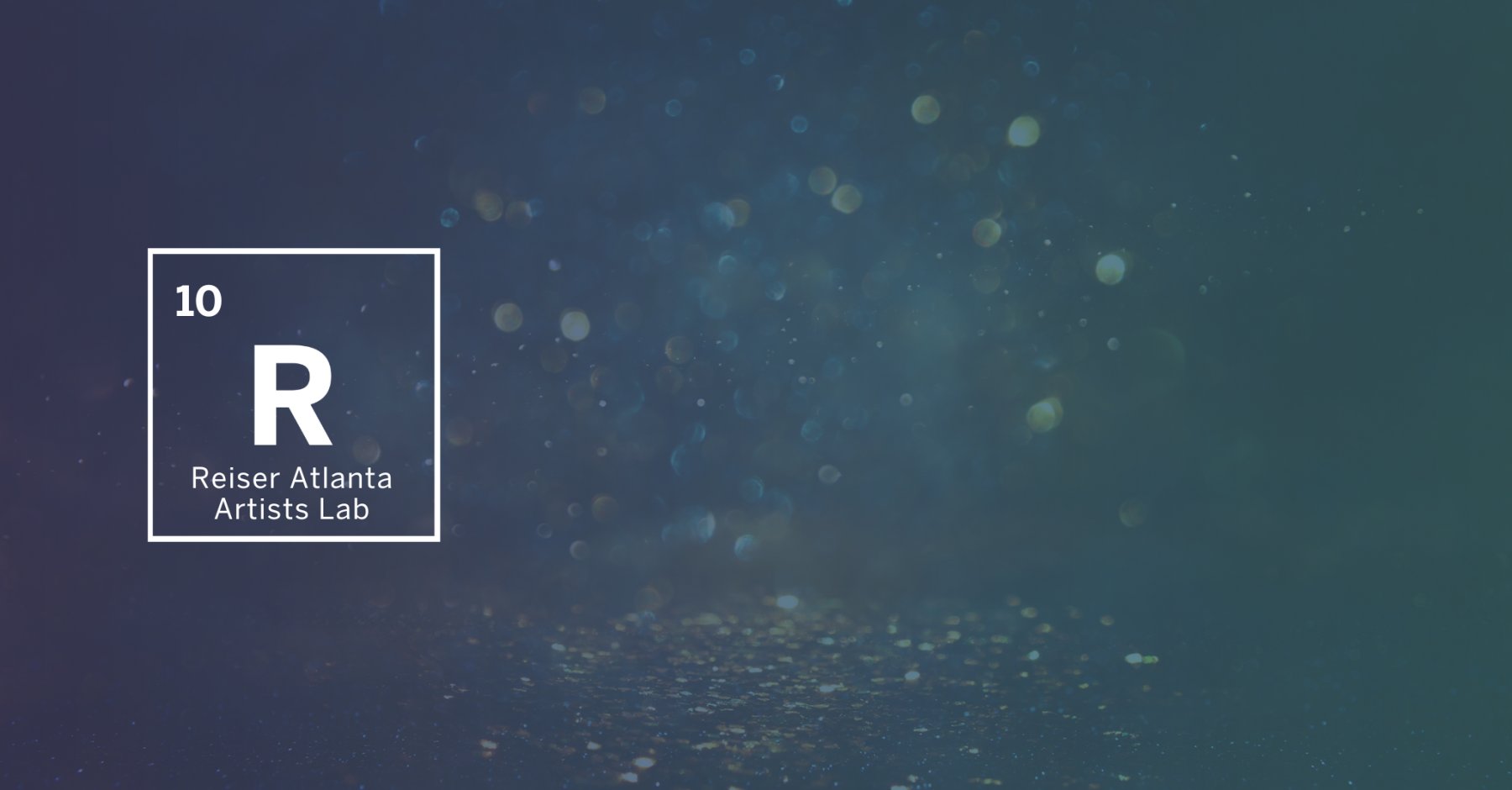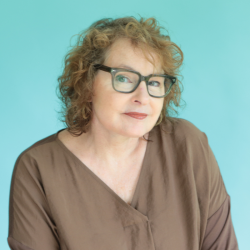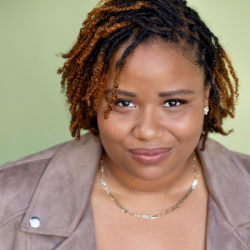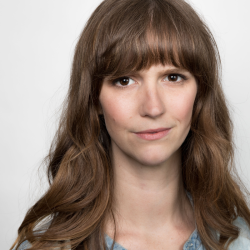The Reiser Lab creates space and opportunity to uplift the voices of Atlanta’s artists. With the support of Alliance Theatre, these artists can model their visions into reality. Each year, three projects receive $10,000 to fund their piece's development along with rehearsal space and artistic mentorship provided by Alliance staff. Encompassing a variety of theater disciplines, three projects are chosen to represent the communities that call Atlanta home.
Read more about the Reiser Atlanta Artists Lab Round 10 projects and their lead artists below. For more on the program, check out the Reiser Atlanta Artists Lab page.
Note: These interviews have been edited for length and clarity. Be advised this article contains some instances of explicit language.
|
Vynnie Meli |
Dayla Nicole |
Emma Yarbrough |
Vynnie Meli, Playwright: Plastic Bottle Genie
The genie in the plastic bottle that Meeka finds on the beach has the best of intentions, but the wishes he grants have unexpected consequences.
Dalyla Nicole, Playwright/Lead Producer: Peps! Cola Bitch
A new play taking on Heteronormativity and Beverage Bias from a very Atlanta, very Black, and very Fem Queer lens.
Emma Yarbrough, Playwright/Actor: Day
Day is one woman’s deeply funny journey through traumatic grief, chronic illness and the untamable joy discovered while she huddled in the darkest recesses of her worst nightmares.
WHAT SPARKED THE INITIAL VISION FOR THE PROJECT, AND HOW HAS IT DEVELOPED OVER TIME?
Emma: My Aunt Day died in August 2014, and as a result, I went through a really difficult period of grief. It felt like I was spending a lot of energy on my creative work but wasn’t actually feeling anything. I was at a point where I was like, “If I’m going to be putting forth what little energy I have at this moment in time, then it needs to be really meaningful to me.” And that’s when I started writing personal essays to perform at various literary events around Atlanta. They weren’t initially about Aunt Day, but eventually they started to be. I found a lot of comfort in storytelling, listening to storytelling podcasts when I was going through everything, because I didn’t know anyone in my life that had dealt with traumatic grief. After listening to other people’s stories, it just started to feel like an internal mandate that I need to make a piece of work to continue her story—so her traumatic death was not the last chapter.
Vynnie: My initial impetus was climate change—because we’re in trouble. I’ve written several plays about the environment and climate change, but this one feels different because it’s for kids in late elementary school. The statistics are astounding: by 2050, there’ll be more plastic in the ocean than fish. All these statistics are wild, and there are things that we can do to change that, so I wanted to write this to help kids—people—realize that they can make little changes that affect the state of our world.
Dalyla: I go by the tried-and-true [statement] “write what you know.” Peps! Cola was the first project of mine where I dove into my personal experience at the intersections of being Black or femme-presenting, queer, Atlanta born and raised, and a millennial, and really leaned into that language to translate it into written form. I was probably largely inspired by Suzan-Lori Parks and the way that she defines what style is, you know, how to define your own style of writing and your own vocabulary. I hadn't seen a play for someone like me at those intersections, and I think that's what I wanted to create. Then with Pepsi and Cola—my family's from the Midwest, and so they drink Pepsi, and I was born in Atlanta, so Coca Cola has always been the drink throughout my life. I always felt a little bizarre drinking Pepsi in Atlanta; at Emory, there used to be a joke around, like, “Oh, you can’t drink Pepsi on this campus”. So, a lot of this—on the lighter end of it—is mostly sourced from my reflections on that.
WHAT DREW YOU TO YOUR OTHER TEAM MEMBERS?
Emma: Caitlin, my producer, and I have been working together in theater since we were both in college. At Theater Emory, we were cast in a two-person show with a very intense rehearsal process that made us really close. Then, we both studied theater abroad, and found a home in physical theater, clowning, and movement-based performance. When we graduated, we wanted to keep making work, and so we’ve been developing new work together for about 15 years. I’ve been working on this show for six years now, and Caitlin has been there every step of the way. She is like a sister to me, and she really knew and loved my Aunt Day. It’s important to have people on the project like her who understand why this person needs to be memorialized.
Even before I met Melissa, I would see her performing in Atlanta and I always thought she was just the most astonishing dancer. When we met and became friends a few years ago, Melissa started exploring grief work in addition to her creative work. She lost her father at a young age, and so she has an intimate relationship with intense grief. I took a workshop with her called “Grief Threads”—she’s a quilter—which was about working with fabric to experience grief, honor it, and look at different cultural traditions [with textiles] to sort of externalize it. I really loved the class, so I took another of hers called “Cry Baby Dance Club”, which was another space for people to come together and feel really big feelings, but this time in our bodies. I went to Cry Baby Dance Club as much as I possibly could, and it just naturally made sense for me to start inviting her to work on this piece with me. I’m really interested in bringing movement into the piece, and with her skills as a choreographer, her connection to grief work, and my friendship with her, she was just kind of a no-brainer addition to the project.
Vynnie: Well, Jimmica Collins—I’ve worked with her for years as an actress on and off on different projects. But boy, she’s also a great dramaturg and puppeteer. She’s worked on Donkey Hodie, the Sesame Street PBS show, and has done a lot of puppetry through the Center for Puppetry Arts, which has always been one of my favorite places in Atlanta. She’s been a great person to work with: first of all, she just has such a youthful look that makes her great for the lead role, but she also knows so much about puppetry. She hooked me up with Cedwan Hooks, a builder and a puppeteer who has also worked with the Center for Puppetry Arts, and I’m so excited about what they both can bring to this. There are a lot of crazy puppets, a couple of live actors, but puppetry is a big part of this.
Dalyla: I was drawn to my team members because of how much I admire them. They're my inspirations. Parker is an incredible director. I had become familiar with Parker from doing some dramaturgy, and really admired the way that she creates a sense of community—both in the rehearsal room and outside of it. From the first moment that I had started submitting the piece to places, I told Parker I would love for her to be my director. I was like, “This is the play that I could imagine being amazing in your eye”.
Amanda is my other inspiration in a lot of different ways: as a producer, director, and even an intimacy director & choreographer. I think she has a beautiful way of playing, exploring and creating. She directed the earlier reading with Dominion Arts Foundation in December of last year, and she just brought so much vision and play. I knew it would be an honor to have her help guide the artist in myself through this year, and I feel so honored that they said yes when I asked her to join this project.
HOW HAS ATLANTA NURTURED YOUR DEVELOPMENT AS AN ARTIST? WHY IS IT IMPORTANT FOR THIS STORY TO BE TOLD IN ATLANTA RIGHT NOW?
Emma: I think that artists in Atlanta often feel, you know, that you reach a certain threshold and then you move to New York or to LA so you can really make a go of it. That's never appealed to me. I grew up in a small town in Alabama, and after being in Atlanta for more than half of my life, I really feel like the Atlanta arts community is my tiny hometown. When you're someone who makes your own work as opposed to auditioning, having a list of collaborators that you trust and respect is invaluable. Atlanta has really provided me with the people more than anything else. The people of Atlanta have given me so much in terms of my artistic practice and my creative development, and I have learned so much from them. The community here is my community. And I think it's irreplaceable.
Vynnie: I think it’s important that this story is told everywhere—but let’s start in Atlanta! Atlanta has been great for me [as an artist]; I wasn’t writing plays when I first moved to Atlanta, and when I did start writing plays my kids were really a big inspiration for me. I was lucky enough to hear about Working Title Playwrights early on, and they were very supportive—that was my community. I learned a lot from the other members and their workshops and seminars. Working Title is just a great place; it’s great to have that community of playwrights here in Atlanta.
Dalyla: Well, Atlanta born and raised! Atlanta has really been my upbringing as an artist and creative. I've had the honor of working with different show houses and theaters across the Atlanta area, and I've been inspired by each process, whether it be something like the Alliance or a smaller company like Working Title Playwrights or Seven Stages. I think each of the companies inspired a lot of my process and overall passion to make something that I know folks of mine need. I also think that underrepresentation was what pushed me to invest more in Atlanta, because I know that Atlanta is a very Black, a very powerful, queer, diverse, culturally rich space. And I just feel that the stories would be better if they reflect that on the stage as much as possible. It's important that our stories reflect our communities, not just in service, but in who's on stage and whose story is being told.
IS THIS PIECE INFORMED BY YOUR IDENTITY? IF SO, WOULD YOU LIKE TO SPEAK TO THAT?
Emma: It’s interesting. I never thought that I would do a solo show. I loved making art, but I consider myself a collaborator, not a lead artist; I want to be on a team, and I want to work with a group of people that I trust and love. But creating work about my life became an important part of getting through an impossible time. I think in a lot of ways my grief—both from Aunt Day and some health issues that I’ve had since I was very young—sort of alienated me and made me feel alone, and in sharing those parts of myself on stage, I can connect with so many people. It’s so clear that I’m not alone in these ways that I just assumed I was. Through sharing these parts of myself so that I can better understand them, but also so that I can see myself reflected in the people who are touched by the work.
Vynnie: Well, everything is written from a point of view, and I have a point of view about [climate change] that I want to express. I can’t help but have my identity in this, but with my plays being character-driven, I try to suppress myself and my personality to let those characters take flight. The familiar adage is, "Write what you know". I write what I want to know. I dig into the world of the play with a lot of research, then I find the characters and let them do the rest.
Dalyla: the piece was definitely informed by my identity, from really trying to write the realities and the world that I've come to know and allow that to speak broadly. This Reiser Lab process in particular is giving the opportunity for time, space, and community development. Each artist supporting the project was selected not just for their incredible artistry, but also taking their identities into consideration, making sure that they have lived experience that relates to the core intersections of the piece. Everyone in the room is giving feedback in a way that takes it beyond just my own personal identity and intersections, but really to speak from the personal to the universal and understanding that these are common experiences across our communities. That's been my joy. I really don't want it to be about me. I really want it to be about community, and I think that this process allows it to be reflective of a lot of our identities, hopefully.
WHY IS IT IMPORTANT TO SUPPORT NEW WORK DEVELOPMENT INITIATIVES?
Emma: I mean, what is art if it's not new—if it's not tackling what is happening today or even what will be happening tomorrow? I think that there is a tendency with arts funding in particular, this sort of standard that, because the funding is so low and so scarce, things can become really risk averse. You see theaters putting on remounts and only doing things that will appeal to a large swath of the population. That certainly has its place, but new work is where we deal with what's happening today—and there is so much happening today that we’re all dealing with. [Without new work,] the line between lived experience and processing it through creativity would be completely broken because then we're no longer dealing with what is actually happening in the world; therefore, the people who consume art—who turn to art to help—would have nowhere to turn.
Vynnie: Because theatre is a living art, and it should reflect our times. Even period pieces help us learn about different episodes in time that we can see differently now with our own [modern] point of view. I do think it’s important to look at any work with a fresh eye, especially plays about women or with women in them. Things have changed so much since the “Me Too” movement and the Dobbs ruling. You could take all of these older works, even operas from the 1700s, and give strong women the opportunity to rewrite them.
Dalyla: I think the old works that are circulating still don't represent the diversity of who we are as people—as humans and communities. I think new play development provides the opportunity to offer representation for the stories that have been neglected, unrepresented, or even oppressed. It gives us a chance to honor and celebrate them. Also, new is fun! I think that it allows us to stay current and present and in our community with what's going on today. It allows us to take an active motion or movement, using art to reflect culture and shape tomorrow's world.
WHAT DO YOU HOPE AUDIENCES TAKE AWAY FROM YOUR WORK?
Emma: I hope that if they're going through something difficult, whether that be traumatic grief or chronic illness, that they feel less alone and they feel they’ll come out the other side a stronger person. And I hope that they take a piece of my Aunt Day with them. Her outlook on life and how she approached living, loving, and creativity is unmatched. It’s helped me so much in all these hard times I've gone through. I would really love to give a little piece of her to other people so that they also have some of her spirit to lean on. I want them to really see through her eyes; her lens was something special.
Vynnie: In general, I want to do positive, uplifting work. With this piece in particular, I want the kids to have fun. I want them to leave reconsidering all the single use items and plastics that we all buy and don’t think about twice. I want them to think twice about it. And I want them to go home and nag their parents, because even if everybody just stopped using plastic straws that would make a big difference. But, as I said, I want them to have fun. I primarily write comedies, so I want people to have fun.
Dalyla: I mostly want for those who identify with the characters to feel seen and feel a sense of community so that they don't feel alone. Because what usually happens when writing a narrative that reflects underrepresented identities is that it becomes an opportunity to help someone not feel as alone. One of the most rewarding responses I've received so far was having a Black trans guy be able to, in the audience, speak to that. He'd never heard his identity represented on stage in that way—that it was honored and not objectified or two dimensional. And to me, that’s the gift of this process: to allow folks to feel seen and celebrated, or at least to feel not as alone.
DESCRIBE THE THEMES OF YOUR WORK IN 3-5 WORDS
Emma: Joy, grief, and the beauty in both
Vynnie: Hope, positivity, self-determination, strong women
Dalyla: Delicious melodrama with southern smirk
The Reiser Atlanta Artists Lab is sponsored by Margaret and Bob Reiser.
The final presentations for the Round 10 projects in the Reiser Atlanta Artists Lab will be presented in the Selig Family Black Box Theatre in Spring 2025.







